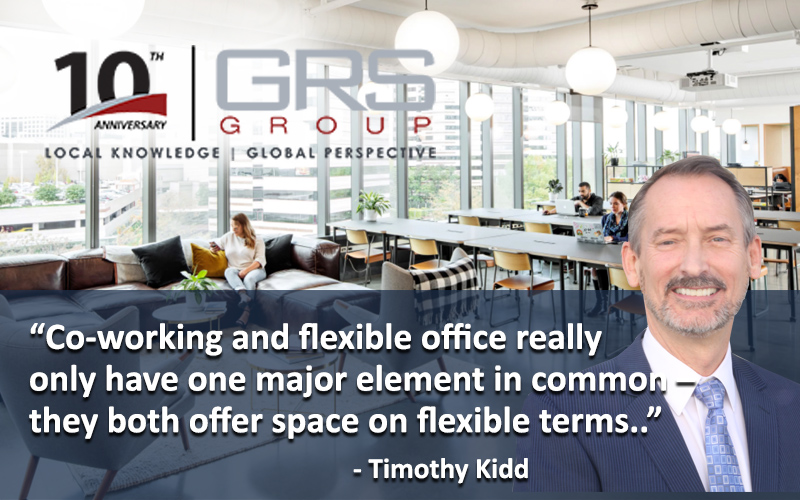Timothy Kidd is a vice president at GRS Group. He can be reached at 323.853.0488 or via email at [email protected]
With all of the different terms out there to describe the current evolution of commercial real estate, it’s pretty easy to get confused. Experiential retail? PropTech? Creative office?
The same goes for the terms “co-working” and “flexible office,” and if you didn’t know the two terms weren’t entirely interchangeable, you’re not alone. You’re in the same boat as a lot of commercial real estate professionals because the two are often lumped together in industry reports.
Lucky for us, the Commercial Observer recently published a Knotel-sponsored white paper on the difference between the two, as well as other insightful information on the state of commercial real estate’s office sector.
Co-working and flexible office are so different that they really only have one major element in common – they offer office space to tenants on flexible terms.
Here’s a breakdown of each so you can see the difference:
Co-Working
Co-working is what one typically thinks of with an operator like Regus or WeWork. As with both of those companies, the operator brands the space (think of the several buildings out there with WeWork signage, and there might be more if its IPO is realized) and leases to tenants on a per-person pricing format, and tenants typically pay as they go or on a monthly basis.
Since co-working spaces will have several different company cultures under one room, a company like WeWork attempts to create an environment that can be attractive to any business working the in its spaces. This can mean relaxing and amenity-filled common spaces, access to private conference rooms and the hosting of business-community events from which many of its tenants could gain networking leads.
This type of environment can be perfect for startups that want a physical office space without having to commit to a long-term lease in an environment where they can feed off of the energy of other firms with similar goals.
Flexible Office Space
These arrangements are typically not for startups. Flexible office tends to be geared toward large enterprise companies looking for blocks of space for their own employees. Branding is customized after the occupant of the space, not the host landlord.
Lease terms are different, as well, with usually a year on the books required. But at the same time, the modular layouts in flexible office can adapt to whatever project a company is working on at the time and space can be easily modified.
Knotel, the paper’s sponsor, happens to be a flexible space provider, so there is a lot of talk in the report about how flexible office is superior to co-working. We won’t examine that debate, but flexible space definitely has its merits for established companies working on a project or task that is long enough to remove it away from overall operations, but short enough that a long-term lease isn’t needed.
In today’s changing commercial real estate environment, both formats are in demand.
About GRS Group
GRS Group is a leading provider of commercial real estate (“CRE”) services worldwide. With offices across the United States, Europe, and affiliates around the globe, GRS Group provides local market knowledge with a global perspective for institutional real estate investors, occupiers and lenders worldwide. The GRS Group team has evaluated and advised on over $1 trillion in CRE transactions.
Through the company’s proprietary management process, Global Services Connection, GRS Group delivers an integrated suite of services including Financial Advisory, Transaction Management, Assessment and Title Insurance. We provide a single point of contact, capable of leveraging the GRS Group portfolio of companies and delivering customized solutions to assist our clients in achieving their investment goals.

